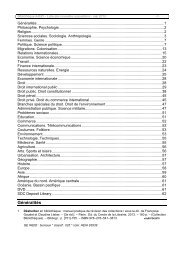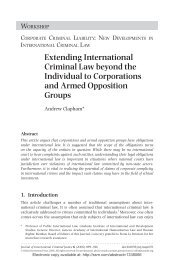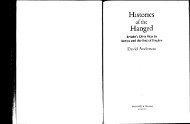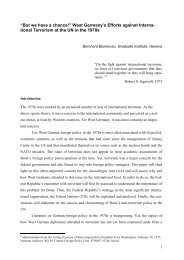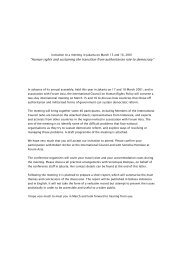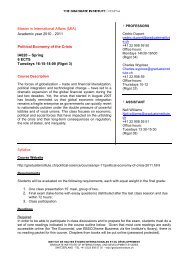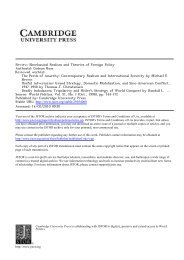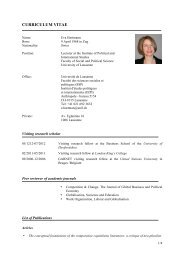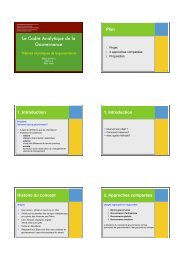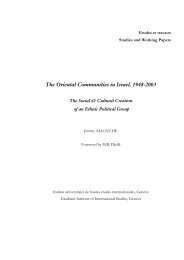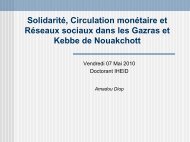Download [pdf] - The Graduate Institute, Geneva
Download [pdf] - The Graduate Institute, Geneva
Download [pdf] - The Graduate Institute, Geneva
Create successful ePaper yourself
Turn your PDF publications into a flip-book with our unique Google optimized e-Paper software.
the rule of law. WTO-anchorage allows<br />
each member to view its own policies<br />
as minor derogations. Yet, at some point,<br />
derogations become the new norm. <strong>The</strong><br />
steady erosion of the WTO’s centricity<br />
will sooner or later bring the world to<br />
a tipping point – a point beyond which<br />
expectations become unmoored and<br />
nations feel justified in ignoring WTO<br />
norms since everyone else does.<br />
This special issue of Globe gathers a<br />
range of insights into the challenges<br />
facing global trade governance in the<br />
21st century. It leads with an interview<br />
with WTO Director General Pascal<br />
Lamy in which he highlights, inter alia,<br />
the risk of a proliferation of different<br />
standards or regulations that may, inadvertently<br />
or otherwise, “lead to trade<br />
slowing down and/or rising trade tensions”.<br />
He points out that regional deals<br />
are politically cheaper, but economically<br />
lower quality.<br />
Most of the other contributions focus<br />
on aspects of the regional road. My<br />
own essay stresses the point that the<br />
WTO is doing just fine when it comes<br />
to traditional trade – trade where things<br />
are made in one nation and sold in<br />
another. But when it comes to supplychain<br />
trade – cross-border flows of<br />
goods, investment, services, know-how<br />
and people associated with international<br />
production networks – WTO<br />
“World trade governance<br />
is at an historical<br />
crossroads… Traditional<br />
approaches – practices that<br />
worked wonders in the<br />
20th century – have failed<br />
in the new century.”<br />
disciplines are being supplanted by<br />
regional rules. Joost Pauwelyn takes a<br />
different tack by noting that the WTO’s<br />
lack of progress on big, formal deals is<br />
part of a general trend, what he calls<br />
informal international lawmaking – nontraditional<br />
actors (national regulators,<br />
central banks, cities or private actors)<br />
engaged in non-traditional processes<br />
(networks or schemes rather than formal<br />
international organisations) and<br />
non-traditional outputs (guidelines,<br />
standards or arrangements rather than<br />
treaties). Noting that new technologies<br />
have reduced costs of networked co -<br />
operation, broader groups of stakeholders<br />
can now get involved in international<br />
cooperation efforts. At the same time,<br />
our complex, diverse and rapidly evolving<br />
society makes formal treaty-based<br />
solutions often too difficult to achieve<br />
and too rigid. Traditional international<br />
law – organisations such as the WTO<br />
– may simply not be adapted to the new<br />
realities. In this world view, the WTO<br />
travails are not a passing issue; it is the<br />
writing on the wall telling us what<br />
future global governance will look like.<br />
Taking a slightly more traditional<br />
approach, Cédric Dupont examines how<br />
regional multi-nation organisations are<br />
playing a role in the regional road the<br />
world seems to be on. Focusing on the<br />
example of ASEAN, he notes they may<br />
help sort out complexity and contri bute<br />
to convergence, but they also raise a<br />
series of questions about the feasibility<br />
of such solutions and interleaving<br />
of regional and global organisations.<br />
<strong>The</strong> contribution by former WTO<br />
Ambassador, Manuel A.J. Teehankee,<br />
who is now a visiting fellow at the<br />
<strong>Graduate</strong> <strong>Institute</strong> Centre for Trade and<br />
Economic Integration, focuses on a<br />
narrower but more novel issue – export<br />
controls. Taking the example of rare<br />
earths, he points out that the WTO is<br />
struggling with the balance between<br />
competing national norms and prerogatives,<br />
and the quest to foster and preserve<br />
a global commons of prosperity<br />
and opportunity for all.<br />
Following the narrower focus, the<br />
essay by Andres Lendle points out that<br />
the “spaghetti bowl” of tariff preferences<br />
is much less pernicious than it<br />
might at first appear. While there are<br />
hundreds of preferential trade agreements<br />
on the books, most are not very<br />
preferential. On most goods and in most<br />
nations, the baseline tariffs are very<br />
low (so little preference is gained from<br />
duty-free access), and most of the hightariff<br />
items are excluded from the preferential<br />
deals. •<br />
LA REVUE DE L’INSTITUT I THE GRADUATE INSTITUTE REVIEW I GLOBE I N11 Printemps I Spring 2013<br />
9


![Download [pdf] - The Graduate Institute, Geneva](https://img.yumpu.com/23370020/10/500x640/download-pdf-the-graduate-institute-geneva.jpg)
